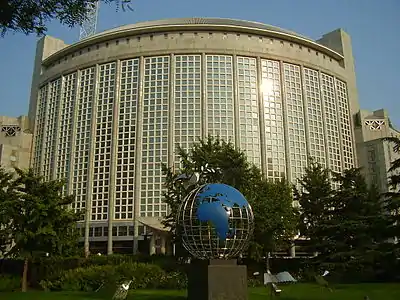Ministry of Foreign Affairs of the People's Republic of China
The Ministry of Foreign Affairs of the People's Republic of China (MOFA or MFA; Chinese: 中华人民共和国外交部; pinyin: Zhōnghuá Rénmín Gònghéguó Wàijiāobù) is the first-ranked executive department of the State Council of the Chinese government, responsible for the foreign relations of the People's Republic of China. It is led by the Foreign Minister, currently State Councilor Wang Yi, who serves as the nation's principal representative abroad.[1] The ministry is headquartered in Chaoyang District, Beijing, the country's primary diplomatic quarter.[2]
| 中华人民共和国外交部 Zhōnghuá Rénmín Gònghéguó Wàijiāobù | |
.svg.png.webp) | |
 Ministry of Foreign Affairs HQ | |
| Agency overview | |
|---|---|
| Formed | September 1954 |
| Preceding agency |
|
| Type | Constituent Department of the State Council (cabinet-level executive department) |
| Jurisdiction | People's Republic of China |
| Headquarters | No. 2, Chaoyangmen Nandajie, Chaoyang District, Beijing |
| Minister responsible | |
| Agency executives |
|
| Parent agency | State Council |
| Child agencies | |
| Website | www.fmprc.gov.cn (in English) |
.svg.png.webp) |
|---|
| This article is part of a series on the politics and government of China |
|
|
The MFA's primary functions include formulating foreign policy, administering the nation's diplomatic missions, representing Chinese interests at the United Nations, negotiating foreign treaties and agreements, and advising the Central Government on foreign affairs. Foreign policies concerning the Republic of China fall under the jurisdiction of the Taiwan Affairs Office. As of 2019, the ministry maintains the largest diplomatic network in the world, with 276 embassies and consulates.[3]
Organization
The Ministry consists of 29 individual offices, including departments responsible for specific regions, policy areas, as well as administration of the Ministry itself. Each office is headed by a director-general with at least two deputy directors-general. The offices are:[4][5]
- The General Office (办公厅): Circulates communications within the Ministry, manages information technology systems, and coordinates with foreign parties in response to crises.
- The Department of Policy Planning (政策规划司): Responsible for research, analysis, and policy formulation related to international affairs. Writes speeches and other major foreign policy documents. Conducts work relevant to Chinese diplomatic history.
- The Department of Asian Affairs (亚洲司)
- The Department of West Asian and North African Affairs (西亚北非司)
- The Department of African Affairs (非洲司)
- The Department of European-Central Asian Affairs (欧亚司)
- The Department of European Affairs (欧洲司)
- The Department of North American and Oceanian Affairs (北美大洋洲司)
- The Department of Latin American Affairs (拉丁美洲司)
- The Department of International Organizations and Conferences (国际司)
- The Department of International Economic Affairs (国际经济司)
- The Department of Arms Control (军控司)
- The Department of Boundary and Ocean Affairs (边界与海洋事务司)
- The Department of Treaty and Law (条约法律司)
- The Information Department (新闻司): Manages press relations and public presentation of Chinese foreign policy. Headed by spokeswoman Hua Chunying.
- The Protocol Department (礼宾司): Handles matters related to protocol in diplomatic events and ceremonies.
- The Department of Consular Affairs (领事司)
- The Department of Hong Kong, Macao and Taiwan Affairs (港澳台司)
- The Department of Translation and Interpretation (翻译司): Manages and provides training for interpretation and translation work in English, Spanish, French, and Portuguese at international events and for state diplomatic events and documents. Regional departments are responsible for general translation and interpretation work within their respective regions.
- The Department of Foreign Affairs Management (外事管理司): Drafts and oversees regulations related to foreign affairs for sub-national entities such as local governments, state-owned enterprises, and other bodies of the State Council of China.
- The Department of External Security Affairs (涉外安全事务司)
- The Department of Personnel (干部司)
- The Bureau for Retired Personnel (离退休干部局)
- The Administrative Department (行政司): Oversees planning, construction, real estate, valuable assets (antiques and artifacts), housing, infrastructure, and overall management in overseas missions.
- The Department of Finance (财务司)
- The Bureau of Archives (档案馆)
- Office of Leading Group for Conducting Inspections in the Foreign Ministry (外交部巡视工作领导小组办公室): Overseas disciplinary investigations and policy in accordance with Chinese Communist Party regulations.
- The Bureau for Chinese Diplomatic Missions Abroad (国外工作局)
- The Department of Services for Foreign Ministry Home and Overseas Offices (服务局): Oversees logistics for diplomatic missions abroad.
References
Citations
- "The Minister". www.fmprc.gov.cn. Retrieved 2020-12-02.
- Home Archived 2006-10-10 at the Wayback Machine. Ministry of Foreign Affairs of the People's Republic of China. Retrieved on October 27, 2010. "Contact us Address: No. 2, Chaoyangmen Nandajie, Chaoyang District, Beijing, 100701 Tel:86-10-65961114."
- Meredith, Sam (2019-11-27). "China has overtaken the US to have the world's largest diplomatic network, think tank says". CNBC. Retrieved 2020-12-02.
- Ministry of Foreign Affairs of the People's Republic of China. "Departments". Archived from the original on 8 March 2020. Retrieved 3 March 2020.
- Ministry of Foreign Affairs of the People's Republic of China. 组织机构 [Organizational Structure] (in Chinese). Archived from the original on 4 March 2020. Retrieved 3 March 2020.
Sources
- Liu, Xiaohong (2001). Chinese Ambassadors: The Rise of Diplomatic Professionalism since 1949. Seattle, WA: University of Washington Press. ISBN 0295980281.
- The Cultural Revolution in the Foreign Ministry of China: A True Story. Translated by Ma Jisen. Hong Kong, China; London, England: The Chinese University of Hong Kong Press ; Eurospan. 2004. ISBN 9629961490.
External links
See also
- Ambassadors of China
- Ministries of the People's Republic of China
- Foreign Minister of the People's Republic of China
- List of Foreign Ministry Spokespersons of the People's Republic of China
- China Foreign Affairs University
- Office of the Commissioner of the Ministry of Foreign Affairs of the People's Republic of China in the Hong Kong Special Administrative Region
- Office of the Commissioner of the Ministry of Foreign Affairs of the People's Republic of China in the Macao Special Administrative Region
.jpg.webp)
_01.jpg.webp)